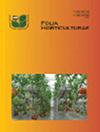Waste apple wood: A safe and economical alternative substrate for the cultivation of Pleurotus ostreatus and Lentinula edodes
IF 2.2
4区 农林科学
Q2 HORTICULTURE
引用次数: 1
Abstract
Abstract The use of waste apple-wood as a source of sawdust to cultivate the mushrooms Pleurotus ostreatus and Lentinula edodes is a common practice, but it is imperative to ensure that the wood does not contain unsafe amounts of heavy-metals or pesticide residues. In this study, we sampled and investigated the pollution of heavy metals and pesticide residues in apple-wood from Yantai, Shandong, China and cultivated P. ostreatus and L. edodes using apple-wood as substrate. Heavy metals, pesticide residues, mineral elements, and biological efficiency were measured. Heavy metals were more commonly detected in the 73 apple-wood samples, but serious pollution was only an isolated phenomenon. No Pb was detected in P. ostreatus and L. edodes. The contents of Hg, As, Cd, and Cr were at safe levels. The contents of Ni were equivalent to those of wild mushrooms. Most notably, chlorpyrifos was detected in all the apple-wood tested. However, chlorpyrifos was only detected in L. edodes cultivated with apple sawdust. No other pesticide residues were detected in the other mushroom samples. The biological efficiency of P. ostreatus cultivated by apple sawdust was 89%, which was 80% of the control. The biological efficiency of L. edodes cultivated with apple sawdust was 81%, which did not differ significantly from the control. Apple-wood can replace wild oak as the material for L. edodes cultivation, but producers should ensure that the raw materials are safe. The main materials chosen to cultivate P. ostreatus should balance the two factors of raw material price and biological efficiency.废苹果木:一种安全、经济的栽培平菇和香菇的替代基质
摘要利用废弃的苹果木作为锯末来源种植蘑菇平菇和香菇是一种常见的做法,但必须确保木材中不含不安全量的重金属或农药残留。在本研究中,我们对山东烟台苹果木中的重金属和农药残留进行了采样和调查,并以苹果木为基质培育了平菇和香菇。测定了重金属、农药残留、矿物元素和生物效率。重金属在73个苹果木样品中更为常见,但严重污染只是一个孤立的现象。在平菇和香菇中未检出铅。汞、砷、镉和铬的含量均处于安全水平。Ni含量与野生蘑菇相当。最值得注意的是,在所有测试的苹果木中都检测到了毒死蜱。然而,毒死蜱只在用苹果木屑培养的香菇中检测到。在其他蘑菇样本中没有检测到其他农药残留。苹果木屑培养平菇的生物学效率为89%,是对照的80%。用苹果木屑培养香菇的生物学效率为81%,与对照相比差异不显著。苹果木可以取代野生橡树作为种植香菇的材料,但生产商应确保原材料的安全。培养平菇的主要材料选择应平衡原料价格和生物效率两个因素。
本文章由计算机程序翻译,如有差异,请以英文原文为准。
求助全文
约1分钟内获得全文
求助全文
来源期刊

Folia Horticulturae
Agricultural and Biological Sciences-Horticulture
CiteScore
3.40
自引率
0.00%
发文量
13
审稿时长
16 weeks
期刊介绍:
Folia Horticulturae is an international, scientific journal published in English. It covers a broad research spectrum of aspects related to horticultural science that are of interest to a wide scientific community and have an impact on progress in both basic and applied research carried out with the use of horticultural crops and their products. The journal’s aim is to disseminate recent findings and serve as a forum for presenting views as well as for discussing important problems and prospects of modern horticulture, particularly in relation to sustainable production of high yield and quality of horticultural products, including their impact on human health.
 求助内容:
求助内容: 应助结果提醒方式:
应助结果提醒方式:


